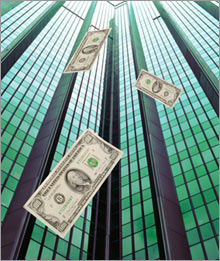Search News
NEW YORK (CNNMoney.com) -- Luckily for banks, the commercial real estate time bomb just keeps on ticking.
Industry observers have issued dire warnings for more than a year, suggesting that lenders are on a collision course with potentially billions of dollars worth of commercial real estate losses.
 |
| Falling commercial real estate values could be another hurdle for banks as they try to navigate troubles in the market. |
But for all the gloomy talk, the fallout has remained relatively well contained.
Banks have already recognized about $50 billion in losses, or about 60% of the estimated cumulative losses, according to real estate research firm Foresight Analytics.
And despite a steep drop in the price of apartments, office buildings and industrial properties nationwide over the past year, there have been recent indicators to suggest that the market may have finally hit bottom.
After 13 months of consecutive declines, overall commercial property values climbed 1%, according to the most recent monthly reading by Moody's/REAL Commercial Property Price Index.
Even well-respected bankers have offered a glass half-full outlook on the state of the commercial real estate market.
"Commercial real estate is a train wreck, but it's already happened," JPMorgan Chase (JPM, Fortune 500) chief executive officer Jamie Dimon said during a company-sponsored conference last month.
But some commercial real estate industry experts have been quick to caution that the problems aren't over yet.
High-profile purchases that were made at the height of the real estate bubble have started to implode left and right. Last month, owners of New York City's Stuyvesant Town and Peter Cooper apartment complexes went into default.
Farther south, lenders that helped finance the Four Seasons Resort and Club just outside of Dallas are moving ever closer to foreclosing on the swanky 400-acre property.
And with the nation's unemployment rate still hovering at 10% and consumer spending still at sickly levels, it stands to reason that borrowers that deal in retail stores and office buildings will feel even more squeezed before long.
"Businesses just aren't taking office space and consumers aren't buying things at retail stores," said Mark Riedy, the executive director for the Burnham-Moores Center for Real Estate at the University of San Diego.
That's a deadly prospect for the thousands of community and regional banks nationwide that hold roughly $860 billion in commercial mortgages and construction and development loans.
Georgia's Synovus Financial (SNV), Zions Bancorp (ZION) of Utah and Buffalo, N.Y.-based M&T Bank (MTB) are just a few banks whose loan portfolios are highly concentrated in commercial real estate, according to credit rating agency Standard & Poor's.
But trying to gauge the scope of those problems has proven difficult as banks have been slow to recognize losses on many of those loans.
That's because many lenders have not seen the need to foreclose on a borrower that is still current on their payments even if they are upside down on their loan, or owing more than their property is worth, experts said.
At the encouragement of industry regulators, banks have extended the terms of many of their commercial real estate loans, hoping that property values or occupancy levels will improve before long.
"There is an element of 'extend and pretend' going on," said Tanya Azarchs, credit analyst and managing director for Standard & Poor's. "It is in their [banks'] interest to do that."
Unfortunately, the consensus is that neither prices nor occupancy rates will improve anytime soon.
Estimates published last November by the Urban Land Institute and PricewaterhouseCoopers suggest that commercial real estate vacancies will continue to increase in 2010, while prices could tumble further during the year. Prices could fall as low as half their peak levels from 2007.
If that happens, that would only darken borrowers' hopes that banks will refinance their outstanding loans. And some $1.4 trillion is commercial real estate debt is expected to come due over the next three years.
Matt Anderson, partner at Foresight Analytics, said that can mean only one thing for banks: more losses.
"When you combine that with [property] value declines, you have a big problem," he said. ![]()






| Index | Last | Change | % Change |
|---|---|---|---|
| Dow | 32,627.97 | -234.33 | -0.71% |
| Nasdaq | 13,215.24 | 99.07 | 0.76% |
| S&P 500 | 3,913.10 | -2.36 | -0.06% |
| Treasuries | 1.73 | 0.00 | 0.12% |
| Company | Price | Change | % Change |
|---|---|---|---|
| Ford Motor Co | 8.29 | 0.05 | 0.61% |
| Advanced Micro Devic... | 54.59 | 0.70 | 1.30% |
| Cisco Systems Inc | 47.49 | -2.44 | -4.89% |
| General Electric Co | 13.00 | -0.16 | -1.22% |
| Kraft Heinz Co | 27.84 | -2.20 | -7.32% |
|
Bankrupt toy retailer tells bankruptcy court it is looking at possibly reviving the Toys 'R' Us and Babies 'R' Us brands. More |
Land O'Lakes CEO Beth Ford charts her career path, from her first job to becoming the first openly gay CEO at a Fortune 500 company in an interview with CNN's Boss Files. More |
Honda and General Motors are creating a new generation of fully autonomous vehicles. More |
In 1998, Ntsiki Biyela won a scholarship to study wine making. Now she's about to launch her own brand. More |
Whether you hedge inflation or look for a return that outpaces inflation, here's how to prepare. More |